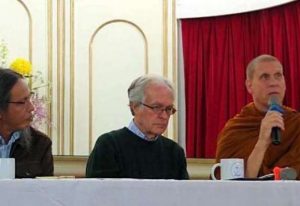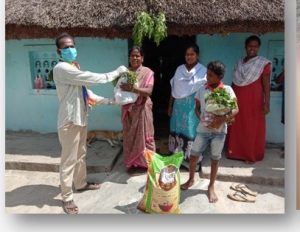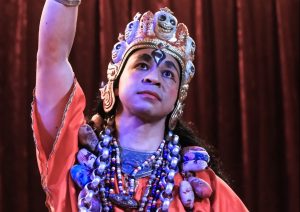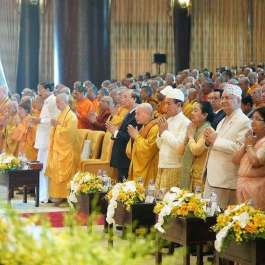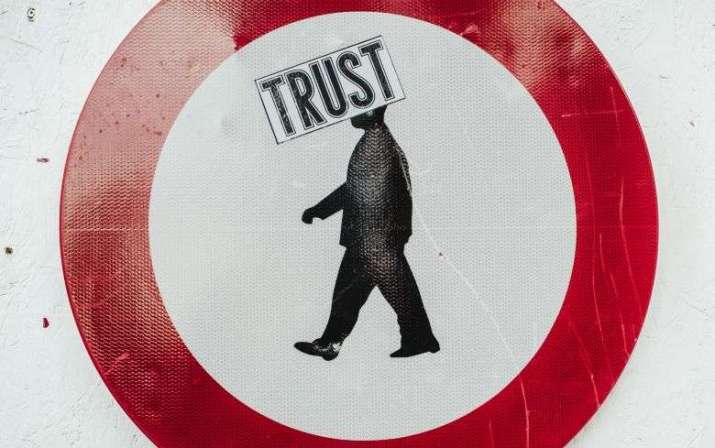
Buddhist economics has a profoundly different understanding of wealth—both from a material and spiritual perspective.* The historical Buddha (AN 7.6 and AN 7.7) taught that there are seven worthy kinds of wealth, namely: faith; virtuous behavior; learning; generosity; wisdom; moral shame; and moral dread. Faith (Pāli: saddhā) is considered the first of the five cardinal virtues (together with vigor, mindfulness, concentration, and wisdom) because it is the “seed” that initiates and empowers humans to the possibility of spiritual transcendence. It is a “leap” from the present to the future, the known to the unknown, and perhaps most importantly, from the shore of suffering to the other shore of happiness.
Saddhā may be translated as confidence or trust, in contrast to doubt, skepticism, or hesitation. However, faith is distinguished from the general notion of trust, beliefs, or acceptance in the Buddhist context. Firstly, Conze (2013) explains that faith may not be intellectually verifiable by immediately available evidence like science. For the Buddhist teaching, the objects of faith are fundamentally: (1) kamma and rebirth, hence the notion of a moral life; (2) the basic teachings about the nature of reality, such as dependent arising and selflessness; (3) the Triple Gem of the Buddha, Dhamma, and Saṅgha; (4) the efficacy of practices, and nibbāna, the cessation of suffering or happiness as the other shore. Secondly, faith is a volition—an act of the mind or will expressed through resolution and courage. Thirdly, faith is emotionally serene and lucid, placing our heart upon something. Finally, faith in Buddhism has a social context. While general trust and confidence could be established in people, ideas, or things, faith involves trust and confidence in the Buddha and the community of Buddhist practitioners. As opposed to subjecting ourselves to social norms or peer pressure, faith according to the Buddhist teachings demands that we see clearly and make conscious choices based on deep understanding and wisdom, as illustrated in the Kalama Sutta (AN 3.65).
Leading trust expert Rachel Botsman would agree that trust is not necessarily rational or quantifiable. Trust requires a leap from the kown to the unknown—there is a gap between the certain and the uncertain. Hence, she defines trust as “a confident relationship to the unknown.” (Botsman 2016) She is fascinated by how humans are capable of taking these remarkable trust leaps and intrigued by the mechanisms through which trust can be earned or lost. In particular, with the advent of new technologies, collaborations are possible in entirely different forms. In the past, earning trust was possible by “climbing the trust stake” of first trusting ideas, then trusting the company or the platform, and finally other people. (Botsman 2017) Nowadays, the public may lose trust in politicians or bankers, or even in institutions such as the government, banks, or religious organizations, but they can still develop a virtual trust toward other strangers.
Trust in the digital age, according to Botsman (2016), has shifted from the traditional institutionalized top-down model, to a distributed and accountability-based one. We no longer need to trust other people in the traditional sense, but we do need to trust the platform. In the new economy, trust becomes the currency, and reputation (as defined by the logarithm) is the measurement of how much such a community can trust you. (Botsman 2012) Ironically, this shift in the trust mechanism, relying on personal qualities, could be more empowering and personal than the commoditized “empty transactions” of the past. In the process of dealing with strangers over a platform, we seem to develop a better understanding with our counterparts than our interactions with the invisible hands of the marketplace. (Botsman 2012)
As discussed earlier, faith—trust with respect to the Buddhadhamma—could lead us further along our spiritual path. Trust with respect to others in our daily life could lead us to a more pleasant and genuine relationship in a community. Trust is hence an important part of the Buddhist moral way of life. The Buddha taught: “Health is the most precious gain and contentment the greatest wealth. A trustworthy person is the best kinsman, Nibbana the highest bliss.” (Dhp. XV: v204) The Buddha also connects the notion of faith with truth. The Buddha proclaims that a person who has faith in something “preserves truth” when he says “this is my faith.” The Buddha contrasts the “preservation of truth” with the “discovery of truth.” As Bhikkhu Bodhi (2005, 87) explains: “Faith serves as a spur to practice; practice leads to experiential understanding; and when one’s understanding matures, it blossoms into full realization.”
Faith and trust therefore both affect our perceived realities. The Buddhist perspective on realitiy is to see things as they truly are: dependent arising and selflessness. Those who fail to see the realities or being not trustworthy are delusional to themselves and others. Therefore, right speech or righteous verbal conduct in the Buddhist teachings would abandon: false speech; malicious or divisive speech; harsh speech; and idle chatter. In essence, right speech promotes communication that advocates truth, harmony, compassion, and meaning. (Bodhi 2005, 159) In the five mindfulness trainings of Plum Village (2020), the training of “Loving Speech and Deep Listening” denotes that:
Aware of the suffering caused by unmindful speech and the inability to listen to others, I am committed to cultivating loving speech and compassionate listening in order to relieve suffering and to promote reconciliation and peace in myself and among other people, ethnic and religious groups, and nations. Knowing that words can create happiness or suffering, I am committed to speaking truthfully using words that inspire confidence, joy, and hope. . . . I am determined not to spread news that I do not know to be certain and not to utter words that can cause division or discord. I will practice Right Diligence to nourish my capacity for understanding, love, joy, and inclusiveness, and gradually transform anger, violence, and fear that lie deep in my consciousness.
While technology shifts the way trust operates by allowing us to trust millions of strangers on a platform, it also presents different virtual realities, false identities, fake news, and fabricated data that hinder trust. As much as it could present the best of humanity, technology can also enable humans to disengage from moral responsibilities, facilitating the degradation of morality and accordingly what makes us human. From the Buddhist perspective, humans suffer because we fail to see things as they truly are. Without appreciating the conditionality of the phenomenal world, humans take the erroneous and false view that there are objective and observable truths outside. These false views will lead us to wrong understandings and inappropriate decision-making—the Principle of Fallibility according to Soros (2010). Participants in any situation can also exert their influence on the world by trying to control and manipulate. Even more problematic is that the Principle of Reflectivity suggests that these erroneous understandings and failings to control or manipulate will create a feedback loop contributing to further uncertainty and risk within the system.
While fakery is not new, technology allows fabrications to appear more real than ever: audio and video recordings can be manipluated and photos falsified. Many identification and verification techniques are no longer failproof. In addition, social media and internet networks facilitate instant broadcasts to mass communities, providing additional leverage to the negative impact of deepfakes and fake news. Although kamma and justice may be served eventually, the damage may have been done and a digital record of false information may last as long as authentic records.
Technology is supposed to support human development rather than degrade us. Imagine a world in which we can no long tell the difference between right and wrong, true and false; a world in which we can no longer trust any idea, any platform, or any other person, what would make us humans and how should we interact with others? As Citron (2019) advocates: “We’re going to need a healthy dose of societal resilience.” It may involve a minimum of regulation, open public discourse, corporate initiatives, and, perhaps most importantly, education of all the stakeholders: “Each and every one of us needs educating. We click, we share, we like, and don’t even think about it. We need to do better. We need far better radar for fakery.” Do we have the moral courage, mental focus, and wisdom to resist the temptations of social media or instant communication and to adhere to truth by cultivating trust and faith?
* The Two Bright Guardians of the World (Buddhistdoor Global)
References
Bodhi, Bhikkhu. 2005. In the Buddha’s Words: An Anthology of Discourses from the Pāli Canon. Somerville: Wisdom Publications.
Bodhi, Bhikkhu. 2013. “Ugga Sutta: To Ugga” (AN 7.7). Access to Insight (BCBS Edition). 30 November 2013. http://www.accesstoinsight.org/tipitaka/an/an07/an07.007.than.html
Botsman, Rachel. 2012. “The Currency of the New Economy is Trust.” TEDGlobal. September 2012. https://www.ted.com/talks/rachel_botsman_the_currency_of_the_new_economy_is_trust/up-next
Botsman, Rachel. 2016. “We’ve Stopped Trusting Institutions and Started Trusting Strangers.” TEDSummit. October 2016. https://www.ted.com/talks/rachel_botsman_we_ve_stopped_trusting_institutions_and_started_trusting_strangers/transcript
Botsman, Rachel. 2017. “The Three Steps of Building Trust in New Ideas and Businesses.” Ted.com. 8 December 2017. https://ideas.ted.com/the-three-steps-of-building-trust-in-new-ideas-and-businesses/
Buddharakkhita, Acharya (trans from the Pāli). 2013. “Sukhavagga: Happiness (Dhp. XV: v204)”, Access to Insight (BCBS Edition), 30 November 2013. http://www.accesstoinsight.org/tipitaka/kn/dhp/dhp.15.budd.html
Citron, Danielle. 2019. “How Deepfakes Undermine Truth and Threaten Democracy.” TEDSummit, 2019. https://www.ted.com/talks/danielle_citron_how_deepfakes_undermine_truth_and_threaten_democracy
Conze, Edward. 2013. “The Way of Wisdom: The Five Spiritual Faculties.” Access to Insight (BCBS Edition), 30 November 2013. http://www.accesstoinsight.org/lib/authors/conze/wheel065.html
Plum Village. “The Five Mindfulness Trainings.” https://plumvillage.org/mindfulness-practice/the-5-mindfulness-trainings/ Accessed 20 January 2020.
Soros, George. 2010. The Soros Lectures: At the Central European University. New York: PublicAffairs.
Thanissaro, Bhikkhu (trans. from Pāli). 2013. “Dhana Sutta: Treasure” (AN 7.6). Access to Insight (BCBS Edition). 30 November 2013. http://www.accesstoinsight.org/tipitaka/an/an07/an07.006.than.html
Thanissaro Bhikkhu (trans. from the Pāli). 2013. “Kalama Sutta: To the Kalamas” (AN 3.65). Access to Insight (BCBS Edition), 30 November 2013. http://www.accesstoinsight.org/tipitaka/an/an03/an03.065.than.html






